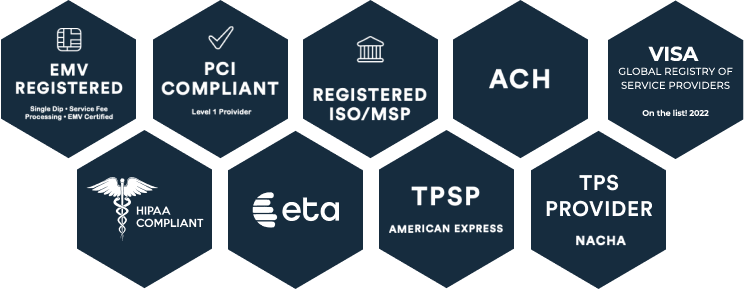Secure merchant services act as a third-party agent between merchants (a business) and payment processors or acquiring banks.
The critical role of a secure merchant service includes:
- Payment Processing: Merchant services provide the infrastructure and technology to enable businesses to accept various payment methods, including credit or debit cards and electronic payments.
- Payment Gateway Integration: For online and card-not-present transactions, it offers payment gateway services that allow businesses to transmit data securely between the customer, merchant, and payment processor.
- Merchant Accounts: Services can assist businesses in setting up merchant accounts that enable funds transfers from customers’ card transactions to the company’s bank account.
- Security and Compliance: Merchant services prioritize security and compliance with industry best practices and regulations through measures to protect sensitive information.
- Integrated Technology: A merchant service effectively ensures that its services integrate seamlessly with the systems in use by a business or organization.
Secure merchant services establish a more secure foundation for electronic payment transactions. This security is essential for organizations across all sectors, including business, government, and non-profit organizations.
Secure Merchant Service: Key Features
Organizations use secure merchant services to enhance the payment experience for consumers and businesses. They enhance the experience through:
- Increased payment processing capabilities
- Streamlined account setup
- Secure payment gateways
- Advanced security measures
- Dedicated customer support
- Compliance assurance
These factors help organizations embrace electronic payments while prioritizing the safety of sensitive financial data. Secure merchant service providers’ range of services and features positions them as indispensable industry partners.
Technological Integration
Consumers expect a modernized payment experience. Merchant service providers help organizations stay current on industry trends, with solutions utilizing the latest payment processing advancements.
This suite of services and solutions establishes several things at once. The optimized payment processing experience combines diverse payment options, user-friendly features, and heightened security protocols. Collectively, these elements contribute to a more efficient and reliable end-to-end payment experience.
Merchant Account Setup
Merchant service providers can help organizations establish merchant accounts, a specialized bank account that allows them to accept and process electronic payments. The benefits of assistance in merchant account setup come through in myriad ways.
These accounts serve as centralized locations for payment management, including tracking transactions, reconciling payments, and monitoring activity. Providers can customize these accounts to specific business needs and collaborate closely with organizations to establish an account that streamlines the routing of funds from customer to merchant.
Diverse Transactional Support
In addition to supporting online transactions, secure merchant services also cater to organizations that engage in in-person transactions and rely on point-of-sale hardware or software for payment processing.
The ability to support both online and in-person transactions makes these services a versatile choice for organizations with diverse operations. This flexibility allows an organization to remain adaptable to changing customer preferences and market dynamics.
Platform Scalability
Secure merchant service providers structure their platforms for scalability. The platforms offer flexibility to adapt to an organization’s changing needs. Flexibility allows them to integrate new features or expand operations without significant disruptions.
The ability to scale with organizations as they grow is crucial for industries that experience changes in customer bases and transaction volumes, such as large businesses in the service industry and government agencies. Scalability helps these entities to remain agile and responsive to the evolving needs of their clients and constituents.
Transparent Costs and Fees
Merchant service providers offer clear pricing structures so businesses understand the breadth of the service costs. Organizations benefit from detailed clarity in merchant service fees, facilitating accurate financial planning. However, this fee structure also translates to additional, tangible cost savings.
Organizations can rest assured that they know the costs associated with merchant services. The absence of hidden fees ultimately helps organizations allocate their resources effectively and direct more of their resources toward other strategic initiatives.
Security and Compliance
With a commitment to best practices and industry regulations, a merchant service provider can assure organizations that they conduct electronic payment transactions within a secure, regulated, and trustworthy environment. Merchants can safeguard their customer’s data and maintain integrity in every transaction.
Secure merchant services incorporate features like data encryption, PCI compliance measures, and regular security audits to signal consumers and organizations that their financial data remains safe. These features instill trust and confidence in the face of cybersecurity threats so the merchant can maintain comprehensive accountability of transactional data.
Secure Merchant Service FAQ
Explore answers to common questions about secure merchant services.
What is the role of a secure merchant service?
The role of a secure merchant service is to provide businesses with the tools and services to accept electronic payments securely, efficiently, and in compliance with industry regulations.
A secure merchant service serves as a conduit to empower organizations to accept various payment methods, which can involve setting up merchant accounts, enabling payment gateways, providing point-of-sale solutions, and implementing data protection security measures.
Why do businesses use secure merchant services?
Businesses leverage a secure merchant service for several reasons, ultimately benefiting from comprehensive service offerings that streamline payment processing, enhance security, ensure compliance, and provide support—all of which contribute to a more efficient payment experience. These providers facilitate many ways to pay, catering to the preferences of a broad consumer base.
The streamlined setup of merchant accounts ensures a smoother flow of funds in each transaction. For organizations engaged in online transactions, this efficient payment processing experience, owing to the integration of secure payment gateways, provides a safe and efficient means of transaction processing.
What do secure merchant services typically offer?
A secure merchant service offers a comprehensive suite of features that facilitate electronic payment transactions, including payment processing, merchant account setup, payment gateway integration, security and compliance measures, and guidance in integration with existing systems and platforms.
How do secure merchant services charge for their services?
Secure merchant services provide organizations with a fee structure and pricing model that includes various components, including transaction fees, monthly fees, chargeback fees, PCI compliance fees, equipment costs, or statement fees.
Secure merchant service pricing varies by provider, package, and industry. You should perform adequate research to ensure the provider’s fee structure aligns with your budget expectations.
Is using a merchant service secure for my business and customers?
Using a merchant service is secure for your business and your customers. Providers prioritize payment transaction security through several robust security measures to safeguard sensitive information.
Secure merchant services providers offer tools and features to help organizations identify and mitigate potential transaction risks, including fraud detection, authentication, and advanced encryption protocols.
Can I use a secure merchant service for online and in-person transactions?
Yes, secure merchant services can support online and in-person transactions for a versatile solution tailored to various transactional needs. For online transactions, it facilitates secure payments through payment gateways. For in-person transactions, the services provide point-of-sale solutions such as hardware and software for payment processing at a physical location.
How do I choose the right secure merchant service provider for my business?
Selecting the right secure merchant service provider for your business requires analysis of several factors to ensure the services offered align with your specific needs. Here are critical steps to guide the process:
- Identify your business requirements, including transaction volume, types of payments, and whether you conduct online or in-person transactions.
- Explore different providers to understand which companies in the market cater to similar organizations.
- Evaluate the range of services offered to ensure they provide the specific features you require.
- Consider the reputation of different providers by researching their industry and experience and browsing merchant service reviews.
- Verify that the company is a secure merchant services provider by whether they offer robust security measures and fraud protection.
- Look for a provider that leverages advanced technology to offer scalability, innovative solutions, and integration support.
Carefully evaluating these factors can help you make an informed decision and direct you toward a merchant service provider that meets your needs.
Can I switch merchant service providers if I’m not satisfied with the service?
You can switch merchant service providers if your organization’s needs have changed or you’ve outgrown your current provider. Still, a smooth transition to a new provider requires consideration and careful planning. Before deciding, ensure you have access and control over your business data and customer information, coordinating with your provider to export or transfer secure data.
Your new provider can facilitate a smooth transition when implementing their services by setting up new software, ensuring compatibility, testing transactions, and ensuring the new solution meets your expectations. A systematic approach to the switch will help minimize disruptions in your operations.

































